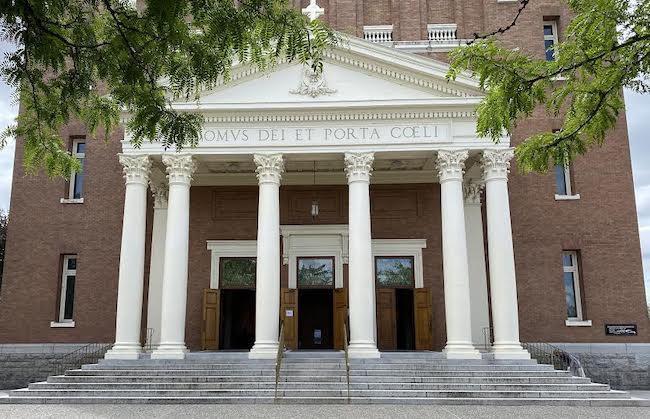By Riley Utley
Henry Holub began his time as the preaching minister at the Northside Church of Christ in at the beginning of the year and now has done the majority of his services virtually rather than in person.

But when Washington Gov. Jay Inslee announced that places of worship would be allowed to reopen for in-person services at limited capacity and under new guidelines in May, Holub was able to reopen the church and begin working towards leading more in-person services than virtual services.
“We promised pretty early on to our members that [the livestream] would be something we offered when we came back so if they needed to wait we would still be able to serve them in some capacity,” Holub said.
Guidelines For In-Person Worship
Spokane is currently in Phase 2 of Washington’s Safe Start re-opening plan. This means that indoor religious services can be held at 25% or with fewer than 50 people whichever is less. There are also many guidelines in place to ensure proper social distancing and sanitation takes place.
These guidelines include sitting 6 feet apart, no congregational singing, no communal food and sanitation between services just to name a few.
Every church is in a slightly different situation, primarily based on how many people they serve in total. For some churches they serve 100 people and others serve well over 1,000. For this reason, while there are many churches in Spokane that have reopened there are still many that haven’t and are still only providing virtual services.
Some Churches Not Ready To Open
Faith Bible Church is one of many that have not reopened yet — they have about 1,000 people who attend their services normally.
“Churches can have up to 50 people in their building and we could but that mean we’d have to have 20 services and that’s not workable,” said Dan Jarms, teaching pastor and team leader at Faith Bible Church. “Also, the requirements are so stringent that even those 50 person services may not be very excited.”
Their plan is to begin offering in-person services in Phase 3 of reopening when they can have 100 people at a time.
“We really want to keep people safe we do not want anyone to get sick. One of the ways I routinely see coronavirus spreading across the United States is at a church. We sing, we hug, we love to hang out together and those are all petri dishes for the coronavirus. We’re just trying to keep people safe and luckily there are good guidelines for it, they’re hard but they’re clear.”
Safe Ways To Worship On Site
However, other churches of similar size have figured out safe ways to offer services again, but it means not everyone has the opportunity to attend Sunday service and will have to continue watching online.
Serving on average 750-950 people a weekend St. Aloysius Parish now offers three services on Sunday and Thursday Confession — all of which are run while following the guidelines put forward by the Catholic Church and the state of Washington.

“We use Eventbrite for people to register for Mass,” said the Rev. Tom Lamanna , pastor of the parish and the superior of the Jesuit community at Gonzaga University. “We have laid down markers in the center isle to show 6-foot gaps and we’ve constructed a makeshift plexiglass shield for people to receive communion, like what you’d see at a grocery store or pharmacy.”
Lamanna also said they do Confession outdoors now around the church by marking the ground with sidewalk chalk to direct people and having a divider up to divide the two people while they talk so they can’t see each other.
A Learning Curve
It’s been a learning curve for all places of worship to find their new normal as they begin to reopen or not.
“I get it; this is not normal,” Holub told his congregation on Sunday. “It’s going to be weird and the journey we’re on is one that won’t make much sense. But I’m happy you’re here with us.”
This sentiment was true within all three of these churches. What they want most is to be with the people of their communities again — and now, even though it’s in a smaller capacity, they can and are working to find their new normal.
“My biggest thing for people who are attending churches is to be gracious to the leaders who are making decisions because we’re all just making it up as we go,” Holub said. “They didn’t teach us this in seminary and there’s not guidebook for how to guide a church through a pandemic.”
If you appreciate this column, please support us by becoming a sustaining FāVS member or giving to our COVID-19 Reporting Fund.










